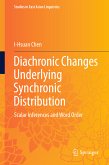Following the trail of the rumors' sources, Luther's Heliand untangles historical relationships between the builders of the Leipzig University Library and several of their students - all men who comprised Luther's innermost circle of Reformation thinkers. In their student notes, letters to colleagues, and printed diatribes against the Church and the Empire, these men recorded vital hints regarding the timing and location of their own discovery of the ancient Germanic Bible. Dating of these published accounts indicates that already several years prior to its dedication by Luther, the fledgling Leipzig University Library housed a medieval codex with features identical to those of the extant Old Saxon Heliand manuscripts, in particular MS L.
Dieser Download kann aus rechtlichen Gründen nur mit Rechnungsadresse in A, B, BG, CY, CZ, D, DK, EW, E, FIN, F, GR, HR, H, IRL, I, LT, L, LR, M, NL, PL, P, R, S, SLO, SK ausgeliefert werden.









